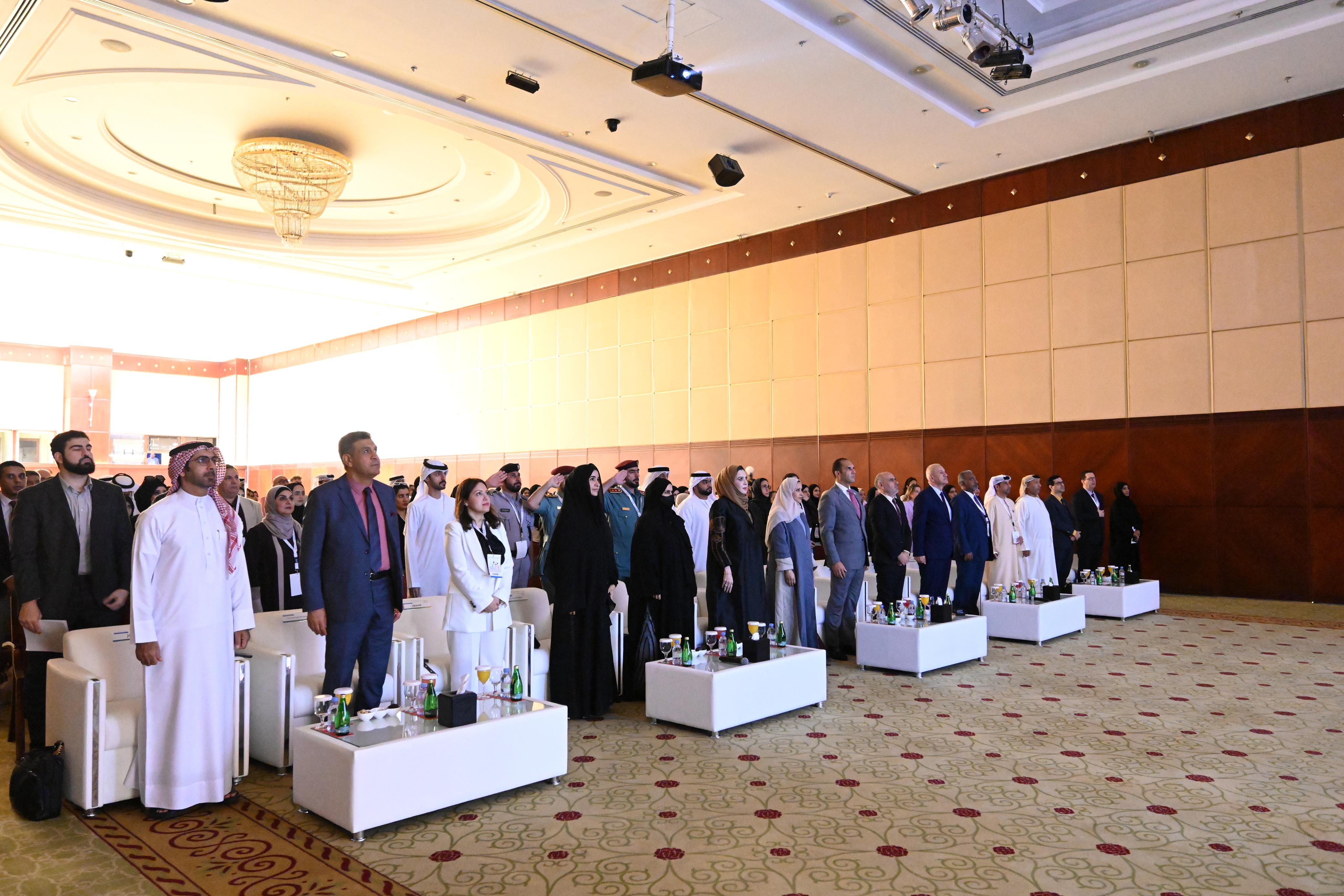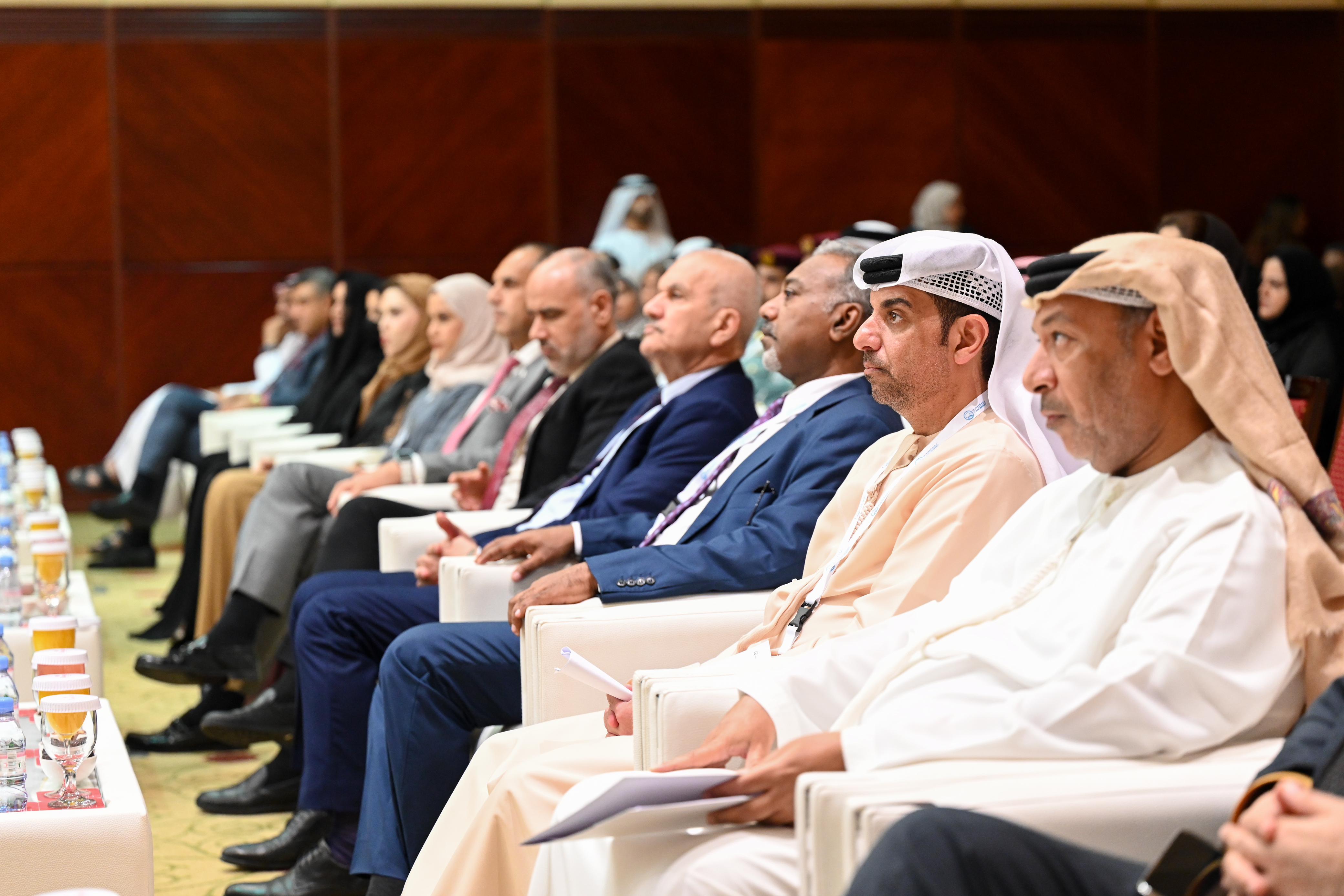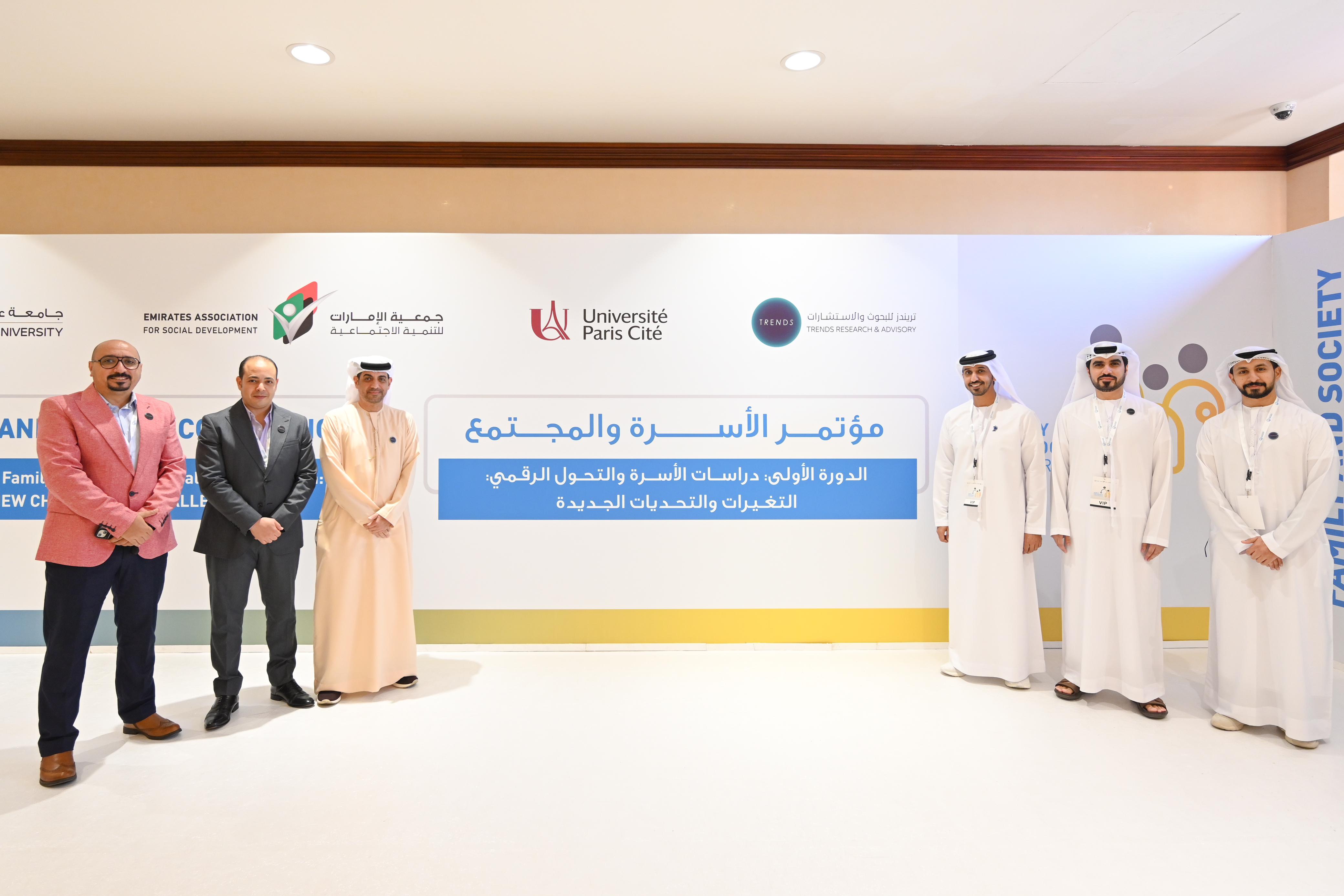TRENDS Research & Advisory, standing as a strategic partner, joins the inaugural international “Family Society Conference” (FSC), organized by Ajman University’s Humanities and Social Sciences Research Center (HSSRC). Themed: ” Family Studies and Digital Transformation: New Changes and Challenges,” the conference spans multiple sessions held throughout the year, with the upcoming ones scheduled for April 24 and 25 at the Sheikh Zayed Center for Conferences & Exhibition – Ajman University.
The inaugural session of the international conference seeks to explore the diverse impacts of digital transformation on families and family studies from multiple angles. It serves as a platform for researchers, scholars, and experts across various disciplines to exchange research findings and enhance the discourse on the influence of the digital revolution on family dynamics—a significant challenge in today’s era.
 Bridging Global Knowledge
TRENDS’ engagement in the conference epitomizes its commitment to active involvement and impactful collaboration as a global thought leader, poised not only to foresee but also to influence future trends. This underscores the Center’s unwavering dedication to advancing scientific inquiry, nurturing a culture of dialogue, and facilitating the exchange of ideas, perspectives, and visions on contemporary global challenges.
During the conference’s inaugural session, Dr. Mohammad Abdullah Al-Ali, CEO of TRENDS Research & Advisory, underscored the pivotal role of the family as society’s cornerstone. He emphasized that the family’s unity and stability are essential prerequisites for societal cohesion and strength. Furthermore, he highlighted the family’s crucial role in instilling values and ethics in individuals. Dr. Al-Ali also stressed the profound significance of family and tribal bonds in Arab cultures, emphasizing the cultural and religious imperatives of preserving family unity and values.
Polarization and the Intrusion of Intellectual Forces
Al-Ali underscored the profound challenges facing national values and identity in the digital age, as they are increasingly susceptible to external intellectual and cultural pressures. Beyond merely influencing newer generations, extremist and terrorist organizations exploit modern digital platforms to disseminate their ideologies, endangering global security and societal cohesion while undermining family ties.
Additionally, Al-Ali observed a growing sense of isolation within families attributable to the digital revolution. This manifests in dwindling collaborative activities and a preference for digital communication over face-to-face interactions. However, amidst these difficulties, the digital revolution has also yielded positive outcomes. It has expanded and enhanced service offerings for families, facilitating smoother communication, and providing access to education, social services, healthcare, remote family programs, and other benefits.
Bridging Global Knowledge
TRENDS’ engagement in the conference epitomizes its commitment to active involvement and impactful collaboration as a global thought leader, poised not only to foresee but also to influence future trends. This underscores the Center’s unwavering dedication to advancing scientific inquiry, nurturing a culture of dialogue, and facilitating the exchange of ideas, perspectives, and visions on contemporary global challenges.
During the conference’s inaugural session, Dr. Mohammad Abdullah Al-Ali, CEO of TRENDS Research & Advisory, underscored the pivotal role of the family as society’s cornerstone. He emphasized that the family’s unity and stability are essential prerequisites for societal cohesion and strength. Furthermore, he highlighted the family’s crucial role in instilling values and ethics in individuals. Dr. Al-Ali also stressed the profound significance of family and tribal bonds in Arab cultures, emphasizing the cultural and religious imperatives of preserving family unity and values.
Polarization and the Intrusion of Intellectual Forces
Al-Ali underscored the profound challenges facing national values and identity in the digital age, as they are increasingly susceptible to external intellectual and cultural pressures. Beyond merely influencing newer generations, extremist and terrorist organizations exploit modern digital platforms to disseminate their ideologies, endangering global security and societal cohesion while undermining family ties.
Additionally, Al-Ali observed a growing sense of isolation within families attributable to the digital revolution. This manifests in dwindling collaborative activities and a preference for digital communication over face-to-face interactions. However, amidst these difficulties, the digital revolution has also yielded positive outcomes. It has expanded and enhanced service offerings for families, facilitating smoother communication, and providing access to education, social services, healthcare, remote family programs, and other benefits.
 Enhancing Family Unity
Dr. Mohammad Al-Ali stressed the crucial imperative of leveraging the digital revolution to fortify family bonds and capitalize on its advantages, while simultaneously tackling the challenges it presents to traditional family values and cohesion. He underscored the necessity of a collaborative approach involving government, society, and families themselves to navigate this intricate landscape.
Al-Ali highlighted the United Arab Emirates’ (UAE) notable dedication to safeguarding and enhancing family unity, evident across various spheres, particularly within its legal framework. Robust legal measures are in place to safeguard and promote family cohesion, complemented by policies and strategies aimed at advancing these objectives. The UAE has established specialized institutions tasked with advocating for and safeguarding Emirati families.
The CEO of TRENDS remarked that this emphasis on Emirati families has propelled the UAE to the forefront of family development metrics. Furthermore, the nation has taken proactive steps to regulate digital communication and technology, aiming to preemptively mitigate any potential threats to the values and solidarity of Emirati families.
Enhancing Family Unity
Dr. Mohammad Al-Ali stressed the crucial imperative of leveraging the digital revolution to fortify family bonds and capitalize on its advantages, while simultaneously tackling the challenges it presents to traditional family values and cohesion. He underscored the necessity of a collaborative approach involving government, society, and families themselves to navigate this intricate landscape.
Al-Ali highlighted the United Arab Emirates’ (UAE) notable dedication to safeguarding and enhancing family unity, evident across various spheres, particularly within its legal framework. Robust legal measures are in place to safeguard and promote family cohesion, complemented by policies and strategies aimed at advancing these objectives. The UAE has established specialized institutions tasked with advocating for and safeguarding Emirati families.
The CEO of TRENDS remarked that this emphasis on Emirati families has propelled the UAE to the forefront of family development metrics. Furthermore, the nation has taken proactive steps to regulate digital communication and technology, aiming to preemptively mitigate any potential threats to the values and solidarity of Emirati families.
 Digital Communities
The international Family Society Conference offers a distinctive opportunity to delve into the influence of digital communities and social networks on family dynamics. Research highlights the profound impact of digital technology on family ties and relationships, as the widespread use of smartphones and social media platforms continues to reshape the nature and frequency of interaction within Arab families. Furthermore, analyzing the implications of the digital age on education, employment, and family roles in Arab societies accentuates the critical need to understand how e-learning affects educational structures and cultural norms within families.
Digital Communities
The international Family Society Conference offers a distinctive opportunity to delve into the influence of digital communities and social networks on family dynamics. Research highlights the profound impact of digital technology on family ties and relationships, as the widespread use of smartphones and social media platforms continues to reshape the nature and frequency of interaction within Arab families. Furthermore, analyzing the implications of the digital age on education, employment, and family roles in Arab societies accentuates the critical need to understand how e-learning affects educational structures and cultural norms within families.
 Bridging Global Knowledge
TRENDS’ engagement in the conference epitomizes its commitment to active involvement and impactful collaboration as a global thought leader, poised not only to foresee but also to influence future trends. This underscores the Center’s unwavering dedication to advancing scientific inquiry, nurturing a culture of dialogue, and facilitating the exchange of ideas, perspectives, and visions on contemporary global challenges.
During the conference’s inaugural session, Dr. Mohammad Abdullah Al-Ali, CEO of TRENDS Research & Advisory, underscored the pivotal role of the family as society’s cornerstone. He emphasized that the family’s unity and stability are essential prerequisites for societal cohesion and strength. Furthermore, he highlighted the family’s crucial role in instilling values and ethics in individuals. Dr. Al-Ali also stressed the profound significance of family and tribal bonds in Arab cultures, emphasizing the cultural and religious imperatives of preserving family unity and values.
Polarization and the Intrusion of Intellectual Forces
Al-Ali underscored the profound challenges facing national values and identity in the digital age, as they are increasingly susceptible to external intellectual and cultural pressures. Beyond merely influencing newer generations, extremist and terrorist organizations exploit modern digital platforms to disseminate their ideologies, endangering global security and societal cohesion while undermining family ties.
Additionally, Al-Ali observed a growing sense of isolation within families attributable to the digital revolution. This manifests in dwindling collaborative activities and a preference for digital communication over face-to-face interactions. However, amidst these difficulties, the digital revolution has also yielded positive outcomes. It has expanded and enhanced service offerings for families, facilitating smoother communication, and providing access to education, social services, healthcare, remote family programs, and other benefits.
Bridging Global Knowledge
TRENDS’ engagement in the conference epitomizes its commitment to active involvement and impactful collaboration as a global thought leader, poised not only to foresee but also to influence future trends. This underscores the Center’s unwavering dedication to advancing scientific inquiry, nurturing a culture of dialogue, and facilitating the exchange of ideas, perspectives, and visions on contemporary global challenges.
During the conference’s inaugural session, Dr. Mohammad Abdullah Al-Ali, CEO of TRENDS Research & Advisory, underscored the pivotal role of the family as society’s cornerstone. He emphasized that the family’s unity and stability are essential prerequisites for societal cohesion and strength. Furthermore, he highlighted the family’s crucial role in instilling values and ethics in individuals. Dr. Al-Ali also stressed the profound significance of family and tribal bonds in Arab cultures, emphasizing the cultural and religious imperatives of preserving family unity and values.
Polarization and the Intrusion of Intellectual Forces
Al-Ali underscored the profound challenges facing national values and identity in the digital age, as they are increasingly susceptible to external intellectual and cultural pressures. Beyond merely influencing newer generations, extremist and terrorist organizations exploit modern digital platforms to disseminate their ideologies, endangering global security and societal cohesion while undermining family ties.
Additionally, Al-Ali observed a growing sense of isolation within families attributable to the digital revolution. This manifests in dwindling collaborative activities and a preference for digital communication over face-to-face interactions. However, amidst these difficulties, the digital revolution has also yielded positive outcomes. It has expanded and enhanced service offerings for families, facilitating smoother communication, and providing access to education, social services, healthcare, remote family programs, and other benefits.
 Enhancing Family Unity
Dr. Mohammad Al-Ali stressed the crucial imperative of leveraging the digital revolution to fortify family bonds and capitalize on its advantages, while simultaneously tackling the challenges it presents to traditional family values and cohesion. He underscored the necessity of a collaborative approach involving government, society, and families themselves to navigate this intricate landscape.
Al-Ali highlighted the United Arab Emirates’ (UAE) notable dedication to safeguarding and enhancing family unity, evident across various spheres, particularly within its legal framework. Robust legal measures are in place to safeguard and promote family cohesion, complemented by policies and strategies aimed at advancing these objectives. The UAE has established specialized institutions tasked with advocating for and safeguarding Emirati families.
The CEO of TRENDS remarked that this emphasis on Emirati families has propelled the UAE to the forefront of family development metrics. Furthermore, the nation has taken proactive steps to regulate digital communication and technology, aiming to preemptively mitigate any potential threats to the values and solidarity of Emirati families.
Enhancing Family Unity
Dr. Mohammad Al-Ali stressed the crucial imperative of leveraging the digital revolution to fortify family bonds and capitalize on its advantages, while simultaneously tackling the challenges it presents to traditional family values and cohesion. He underscored the necessity of a collaborative approach involving government, society, and families themselves to navigate this intricate landscape.
Al-Ali highlighted the United Arab Emirates’ (UAE) notable dedication to safeguarding and enhancing family unity, evident across various spheres, particularly within its legal framework. Robust legal measures are in place to safeguard and promote family cohesion, complemented by policies and strategies aimed at advancing these objectives. The UAE has established specialized institutions tasked with advocating for and safeguarding Emirati families.
The CEO of TRENDS remarked that this emphasis on Emirati families has propelled the UAE to the forefront of family development metrics. Furthermore, the nation has taken proactive steps to regulate digital communication and technology, aiming to preemptively mitigate any potential threats to the values and solidarity of Emirati families.
 Digital Communities
The international Family Society Conference offers a distinctive opportunity to delve into the influence of digital communities and social networks on family dynamics. Research highlights the profound impact of digital technology on family ties and relationships, as the widespread use of smartphones and social media platforms continues to reshape the nature and frequency of interaction within Arab families. Furthermore, analyzing the implications of the digital age on education, employment, and family roles in Arab societies accentuates the critical need to understand how e-learning affects educational structures and cultural norms within families.
Digital Communities
The international Family Society Conference offers a distinctive opportunity to delve into the influence of digital communities and social networks on family dynamics. Research highlights the profound impact of digital technology on family ties and relationships, as the widespread use of smartphones and social media platforms continues to reshape the nature and frequency of interaction within Arab families. Furthermore, analyzing the implications of the digital age on education, employment, and family roles in Arab societies accentuates the critical need to understand how e-learning affects educational structures and cultural norms within families.



